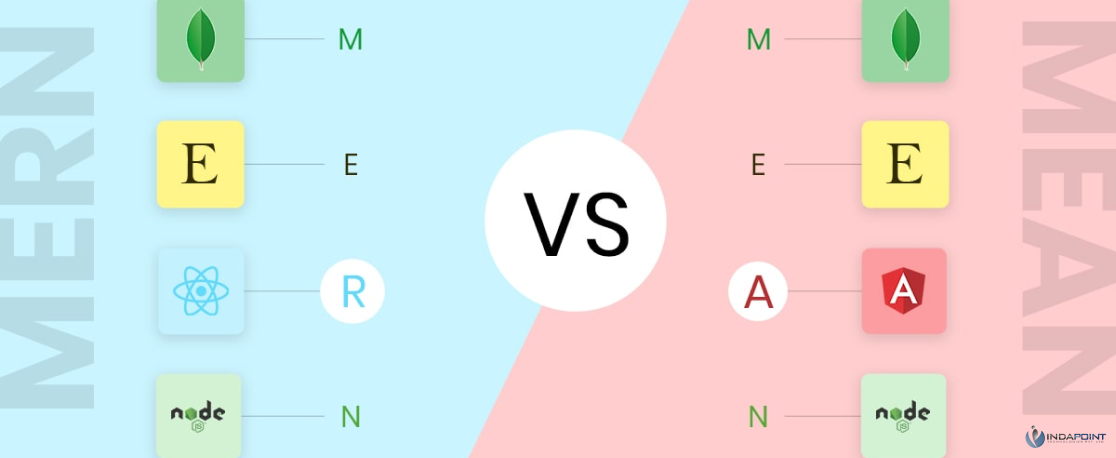MEAN vs. MERN: Which is Best for Web Development?
June 3, 2024

The blog compares MEAN and MERN stacks for web development. MEAN, with MongoDB, Express.js, Angular and Node.js, suits large-scale applications, ensuring a structured framework and efficient data handling. MERN, replacing Angular with React, excels in dynamic, interactive projects due to its component-based approach and virtual DOM.
MEAN vs. MERN: Which is Best for Web Development?
In the dynamic world of web development, choosing the right technology stack can significantly impact the success and efficiency of your project. Two popular stacks that often come under comparison are MEAN (MongoDB, Express.js, Angular, Node.js) and MERN (MongoDB, Express.js, React, Node.js). Both stacks offer robust solutions for building dynamic web applications, but they have distinct differences that can influence your decision.
Understanding MEAN Stack
The MEAN stack is a full-stack JavaScript solution that provides a comprehensive set of tools for developing web applications.
- MongoDB : A NoSQL database that stores data in flexible, JSON-like documents. It allows for scalable and efficient data management.
- Express.js : A minimal and flexible Node.js web application framework that provides robust features for building single and multi-page web applications.
- Angular : A TypeScript-based open-source front-end web application platform developed by Google. Angular offers a rich set of features and a highly structured framework for building dynamic and responsive user interfaces.
- Node.js : A JavaScript runtime built on Chrome’s V8 JavaScript engine. Node.js enables the development of scalable and high-performance server-side applications.
Advantages of MEAN Stack

- Uniform Language : Since MEAN uses JavaScript for both client-side and server-side development, it simplifies the development process and allows for seamless data interchange between the front-end and back-end.
- Community Support : Each component of the MEAN stack is backed by a strong and active community, ensuring regular updates and extensive resources for developers.
- Angular’s Rich Features : Angular provides a comprehensive framework with powerful features such as two-way data binding, dependency injection and a modular architecture, making it ideal for building large-scale applications.
- Full-Stack Development : MEAN enables full-stack development with a single language, reducing the need for switching contexts and improving developer productivity.
Understanding MERN Stack
The MERN stack shares three of its components with MEAN (MongoDB, Express.js, and Node.js) but replaces Angular with React:
- React : A JavaScript library for building user interfaces, developed and maintained by Facebook. React is known for its component-based architecture and efficient rendering using a virtual DOM.
Advantages of MERN Stack
- Component-Based Architecture : React’s component-based approach allows developers to build reusable UI components, enhancing code maintainability and scalability.
- Efficient Rendering : React’s virtual DOM enables efficient updating and rendering of web pages, leading to better performance and a smoother user experience.
- Flexibility : Unlike Angular, which is a full-fledged framework, React is a library. This gives developers the flexibility to integrate other libraries and tools as needed, tailoring the stack to specific project requirements.
- Strong Community and Ecosystem : React boasts a large community and a rich ecosystem of tools and libraries, providing extensive support and resources for developers.
MEAN vs. MERN: A Comparative Analysis

Learning Curve
- MEAN : Angular’s steep learning curve can be a hurdle for beginners. Its comprehensive framework requires understanding various concepts and patterns.
- MERN : React is relatively easier to learn and has a gentler learning curve. Its simplicity and focus on building UI components make it accessible to newcomers.
Performance
- MEAN : Angular’s two-way data binding can sometimes lead to performance bottlenecks in large applications due to frequent DOM updates.
- MERN : React’s virtual DOM and unidirectional data flow result in better performance, especially in applications with high user interactions and dynamic data.
Flexibility and Scalability
- MEAN : Angular’s opinionated structure provides a clear and consistent development approach, which can be beneficial for large-scale projects requiring strict architectural guidelines.
- MERN : React’s flexibility allows developers to choose their architecture and tools, making it ideal for projects that need a custom setup and high scalability.
Development Speed
- MEAN : The comprehensive nature of Angular, with built-in features and tools, can speed up development for complex applications.
- MERN : React’s simplicity and the availability of a wide range of third-party libraries can accelerate development, especially for projects with straightforward requirements.
Conclusion
Choosing between MEAN and MERN depends on your project needs and team expertise. MEAN’s structured framework is ideal for large-scale, enterprise-level applications requiring a consistent architecture and efficient data handling. In contrast, MERN’s component-based approach and virtual DOM are better suited for dynamic, interactive applications with high user engagement.
At IndaPoint, we understand the intricacies of both MEAN and MERN stacks and can help you determine the best fit for your web development project. Our team of experienced developers is equipped to deliver top-notch results.





